Weekend at Bernie's 2
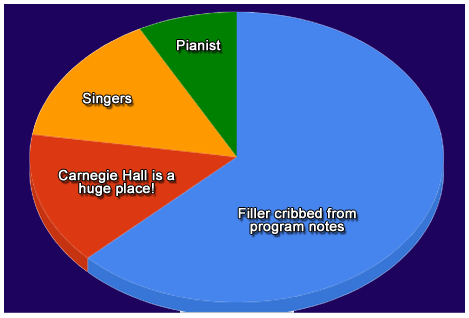


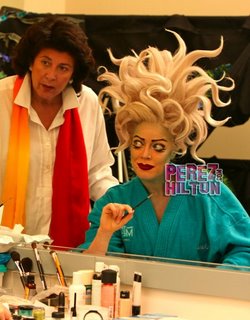 "Directed by Francesca Zambello, this Little Mermaid burdens its performers with ungainly guess-what-I-am costumes (by Tatiana Noginova) and a distracting set (by George Tsypin) awash in pastels gone sour and unidentifiable giant tchotchkes that suggest a Luau Lounge whipped up by an acid-head heiress in the 1960s. The whole enterprise is soaked in that sparkly garishness that only a very young child — or possibly a tackiness-worshiping drag queen — might find pretty.
"Directed by Francesca Zambello, this Little Mermaid burdens its performers with ungainly guess-what-I-am costumes (by Tatiana Noginova) and a distracting set (by George Tsypin) awash in pastels gone sour and unidentifiable giant tchotchkes that suggest a Luau Lounge whipped up by an acid-head heiress in the 1960s. The whole enterprise is soaked in that sparkly garishness that only a very young child — or possibly a tackiness-worshiping drag queen — might find pretty.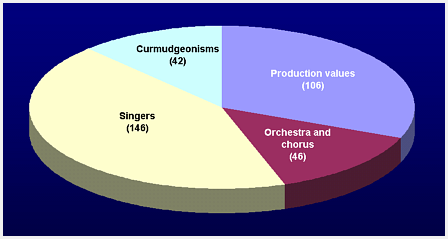
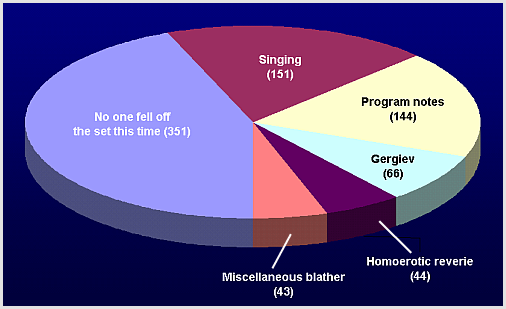
Zambello has allowed emotion, charm and enchantment to be drowned in a sea of bewilderingly over-stylized designs .... visual incoherence, plus some not always useful elaboration of a simple, disarming storyline, make what should have been a slam-dunk for stage presentation a waterlogged misstep .... if Disney Theatrical chief Thomas Schumacher's aim in enlisting Zambello and team was to develop another eye-popping theatrical event to transcend the kid-fare label, he needs to keep fishing. (Variety)Zambello takes pains to explain "in a remarkably un-defensive tone" that even without a massive marketing effort, a show with the obscure and forbidding title "Disney's The Little Mermaid" still managed to sell a lot of tickets in Denver. The damning review in Variety she dismisses as (literal) nepotism, since, as she points out, the editor-in-chief of the showbiz rag is the uncle of Roger Bart, who is the star of Young Frankenstein: The New Mel Brooks Musical. (Having both shows on Broadway simultaneously obviously would split the the "bazoom and fart joke" demographic so key to the success of a Disney musical.)
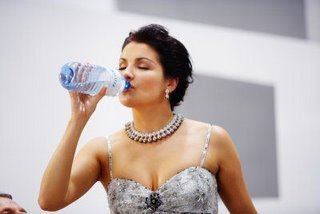 "... Netrebko is the larger presence. She has an earthiness and impishness — a daredeviltry — that may prevent her from ever attaining the kind of rarefied, disembodied sainthood that has been awarded, for example, to the American sopranos Renée Fleming and Dawn Upshaw but that also makes her more fun to watch." Charles McGrath writes a gazillion words or so about "A New Kind of Diva" in this weekend's Sunday Times magazine.
"... Netrebko is the larger presence. She has an earthiness and impishness — a daredeviltry — that may prevent her from ever attaining the kind of rarefied, disembodied sainthood that has been awarded, for example, to the American sopranos Renée Fleming and Dawn Upshaw but that also makes her more fun to watch." Charles McGrath writes a gazillion words or so about "A New Kind of Diva" in this weekend's Sunday Times magazine.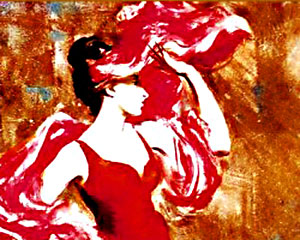 "My theory: Composers who ignore significant parts of their being - nationality included - cut their creativity off at the knees. Barber was being derivative in self-defeating ways out of deference to the operatic genre. Bernstein, in comparison, was out to tell important stories using the most effective means possible..." David Patrick Stearns adds his voice to the debate about Vanessa in the Philadelphia Inquirer.
"My theory: Composers who ignore significant parts of their being - nationality included - cut their creativity off at the knees. Barber was being derivative in self-defeating ways out of deference to the operatic genre. Bernstein, in comparison, was out to tell important stories using the most effective means possible..." David Patrick Stearns adds his voice to the debate about Vanessa in the Philadelphia Inquirer.Labels: alex ross, critic, festoonery, gay gay gay gay gay
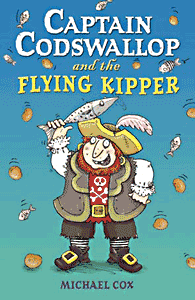 "Ye Gods! In all the annals, can there be an opera containing more unmitigated codswallop than Erich Korngold's Das Wunder der Heliane ('The Miracle of Heliane')?" Their Own Rupert Christiansen continues:
"Ye Gods! In all the annals, can there be an opera containing more unmitigated codswallop than Erich Korngold's Das Wunder der Heliane ('The Miracle of Heliane')?" Their Own Rupert Christiansen continues:Dreadfully overheated and over-loud, the prolix first act has a slavering and maudlin sensuality that gave me the creeps ....
[T]he rapturous sublimity that glows through the last 20 minutes struck me as profoundly bogus and cheap. Why Jurowski and the LPO should wish to waste their talents and time on this tosh beats me ....
I felt slightly sick when it was all over and had to lie down in a darkened room.
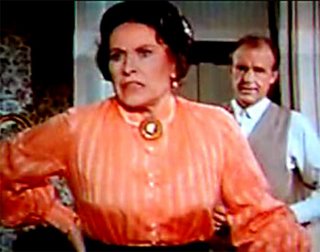 "Soprano Lauren Flanigan turned her vaunted acting skills to the task of portraying the sophisticated allure of Vanessa, hampered more than a little by a stiff auburn wig and dowdy costumes that left her looking like Nellie Oleson's mother. Happily, on November 8, Flanigan was in superb voice, sailing fearlessly up to fiery high B's and C's and plunging into a well-projected chest register." Our Own JJ reviews NYCO's Vanessa and Cendrillion for Gay City News.
"Soprano Lauren Flanigan turned her vaunted acting skills to the task of portraying the sophisticated allure of Vanessa, hampered more than a little by a stiff auburn wig and dowdy costumes that left her looking like Nellie Oleson's mother. Happily, on November 8, Flanigan was in superb voice, sailing fearlessly up to fiery high B's and C's and plunging into a well-projected chest register." Our Own JJ reviews NYCO's Vanessa and Cendrillion for Gay City News. 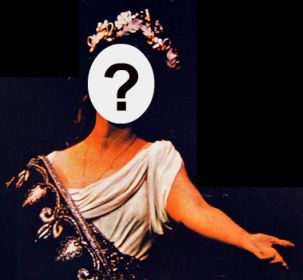 La Cieca was just wondering about something yesterday on opera-l, and doggone if Anne Midgette wasn't wondering about the same thing today in the New York Times. (That woman haunts my dreams, I tell you. It's like she's inside my head. Now, where was I? Oh, yes...) The point that dear Anne and I (among others) have mulling is this:
La Cieca was just wondering about something yesterday on opera-l, and doggone if Anne Midgette wasn't wondering about the same thing today in the New York Times. (That woman haunts my dreams, I tell you. It's like she's inside my head. Now, where was I? Oh, yes...) The point that dear Anne and I (among others) have mulling is this:The opera was chosen by Fräu Lehmann for her benefit, and from a financial point of view her selection was a very wise one . . . . From an artistic point of view the choice does not seem to be so commendable. There is no artistic reason why Lilli Lehmann should present herself to the New York public as a colorature singer. She may have been actuated by a not unnatural desire to display her versatility, but to get up a performance of Bellini's "Norma" for her benefit savors rather of self-esteem than of a strong devotion to honest art . . . . She demonstrated that her voice possessed far more flexibility and that she had a greater command of the pure ornamentation of signing that anyone suspected ... It must be said, however, that Fräu Lehmann took many of the elaborate ornamental passages at a very moderate tempo and sang them with very evident labor, thus depriving them of much of that brilliancy which the smooth, mellow, pliable Italian voices impart to them. Fiorituri without brilliancy have no "raison d' étre," and no Italian diva of standing would have received half the applause that Fräu Lehmann did for singing these passages as she did. The audience was excited by astonishment at the fact that she could do it at all.Well, that was a longer pullquote than La Cieca originally intended to use, but, goodness, that is such excellent critical writing, isn't it? Anyway, back to the argument. Lehmann, Rosa Ponselle, Gina Cigna, Zinka Milanov and of course Maria Callas were all big established stars when they took on Norma at the Met. So were Joan Sutherland and Montserrat Caballé. If Shirley Verrett, Renata Scotto and Jane Eaglen received mixed reviews for their Met performances of the opera, it wasn't because of lack of star power or clout -- they were all extremely important names on the Met roster at the time of their casting.
Labels: bel canto, caballe, critic, fleming, met, midgette, nyt, scotto, voigt
Must we hear about it every time this Crack Addict attempts to rehabilitate himself with some new--and typically half witted--political grandstanding?Johnson also says Page has confirmed that his supervisors at the Post have already taken disciplinary action against him. According to a source, Page has been placed on leave.
I'd be grateful if you would take me off your mailing list. I Cannot think of anything the useless Marion Barry could do that would interest me in the slightest, up to and including overdose.
Sincerely, Tim Page
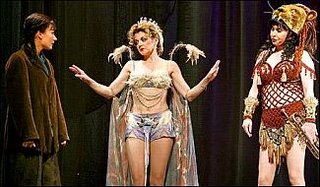 La Cieca's spiritual godmother Tessi Tura (or, more accurately, Ms. Tura's alter ego George Heymont) has finally emerged from a "retirement" of over a decade. George has turned to the blog format to complete a project he's had on the back burner since 1990 or so, "a murder mystery set at the Metropolitan Opera House." La Cieca is sure her cher public will want to follow the progress of this latest Heymontiana (Heymontade?) at A Dying Art Form.
La Cieca's spiritual godmother Tessi Tura (or, more accurately, Ms. Tura's alter ego George Heymont) has finally emerged from a "retirement" of over a decade. George has turned to the blog format to complete a project he's had on the back burner since 1990 or so, "a murder mystery set at the Metropolitan Opera House." La Cieca is sure her cher public will want to follow the progress of this latest Heymontiana (Heymontade?) at A Dying Art Form.
Labels: critic, levine, little stevie, met, our own
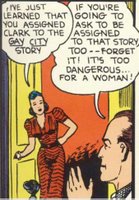 Adept arbiter Anne Midgette has announced her farewell to The New York Times, moving on up to the Washington Post where she will reign as interim chief critic beginning January 1. The WaPo's current chief critic, Tim Page, is off to teach a semester at USC and, who knows, may extend his stay in academe to something more lasting. We here at parterre.com will miss la Midgette's pungent and always well-supported critiques of New York performances, and we look forward to her take on the WNO.
Adept arbiter Anne Midgette has announced her farewell to The New York Times, moving on up to the Washington Post where she will reign as interim chief critic beginning January 1. The WaPo's current chief critic, Tim Page, is off to teach a semester at USC and, who knows, may extend his stay in academe to something more lasting. We here at parterre.com will miss la Midgette's pungent and always well-supported critiques of New York performances, and we look forward to her take on the WNO.Labels: critic, la cieca ci guarda la cieca ci vede, midgette
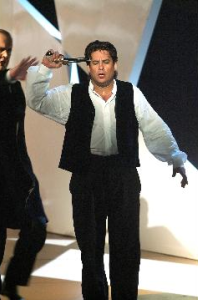 Tenor Marcelo Alvarez is seen just after reading a Bloomberg News review of his performance in Luisa Miller at the Verdi Festival in Parma. Was it really all that bad? Well, you decide.
Tenor Marcelo Alvarez is seen just after reading a Bloomberg News review of his performance in Luisa Miller at the Verdi Festival in Parma. Was it really all that bad? Well, you decide.Labels: critic, hunkentenor
Verdi has a way of testing his singers at the opening curtain. (See also "La Traviata," Act I, Scene 1.)
Labels: 2007, bel canto, critic, dessay, gcn, giordani, hunkentenor, met, netrebko, nyco, review, stephen costello
Renée Fleming just might be the the world's most undivalike diva. [well, duh!]
Much like, say, Audrey Hepburn, the 48-year-old soprano manages to gracefully balance sophistication and poise with an appealing sense of grounded genuineness. [whaaaaaa...?]
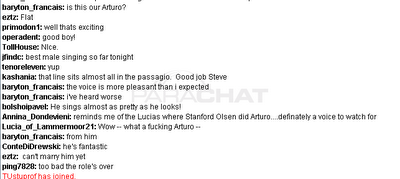
Labels: blog, chat, critic, hunkentenor, sieglinde, stephen costello
Labels: critic, first emperor, laura hope cruisey
Labels: critic
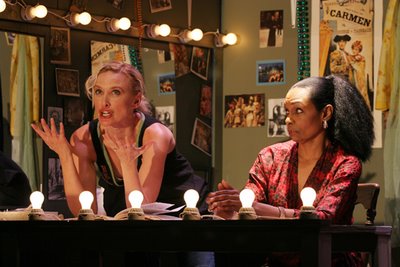
Rachel deBenedet and Vivian Reed in The Second Tosca. (Photograph by Neilson Barnard.)
Labels: camp, critic, crossover, diva, festoonery, gay gay gay gay gay, gcn, jj, this diva looks like that diva
Labels: blog, camp, critic, diva, drag, filth, fleming, gay gay gay gay gay, gcn, la cieca ci guarda la cieca ci vede, maury d'annato, met, midgette, nyco, nyt, our own, parody, podcast, review, voigt, youtube
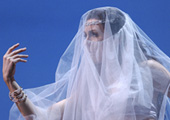 La Cieca has just been informed that soprano Mary Dunleavy will participate in tonight's panel discussion "Opera and Technology" at The Italian Academy for Advanced Studies in America at Columbia University. No word on whether La Dunleavy replaces or supplements the previously announced Lucy Shelton. Our own JJ will be there of course, along with a veritable constellation of opera pundits: Elena Park, Editorial and Creative Content, The Metropolitan Opera; Beth Greenberg, stage director, New York City Opera; Wayne Koestenbaum, poet and writer; and Anne Midgette, critic, The New York Times. That's tonight at 7:30 PM, 1161 Amsterdam Avenue (between 116th and 118th Streets), second floor.
La Cieca has just been informed that soprano Mary Dunleavy will participate in tonight's panel discussion "Opera and Technology" at The Italian Academy for Advanced Studies in America at Columbia University. No word on whether La Dunleavy replaces or supplements the previously announced Lucy Shelton. Our own JJ will be there of course, along with a veritable constellation of opera pundits: Elena Park, Editorial and Creative Content, The Metropolitan Opera; Beth Greenberg, stage director, New York City Opera; Wayne Koestenbaum, poet and writer; and Anne Midgette, critic, The New York Times. That's tonight at 7:30 PM, 1161 Amsterdam Avenue (between 116th and 118th Streets), second floor.Labels: 2008, blog, camp, critic, diva, filth, gay, jj, met, midgette, nyco, nyt, our own, podcast, youtube
While Belgian-born Mortier’s fellow students were trashing universities and other sites of the “establishment” across Europe in 1968, Mortier was disrupting opera productions he considered too conservative, according to a New York Times magazine profile. Now he sits atop the world he once sought to overturn, exploring, as he puts it, “socio-political associations” in opera. Mortier is the musical equivalent of the academic tenured radical—Roger Kimball’s famous phrase for 1960s campus protesters who now run universities.H-Mac goes on to invoke the usual gang of boogeymen: Peter Sellars, Calixto Bieito, Pamela Rosenberg ... you know, the hate-music leftist crowd. The point that none of these three has the slightest influence in American music or theater at the moment seems to escape Ms. Mac Donald. But, after all, logic has so little place in scare tactics, does it?
One may read consistently brilliant cultural criticism on a blog or else unremitting unspellchecked drivel. But that's the risk one takes in reading any sort of journalistic writing. The difference is that in more traditional media, the grossly incompetent tend to get sifted out before they actually get published. An idiot blogger needs only to figure out how to turn on the computer.
But no writing can have cultural value unless it is actually read, and no writer can make an impact on the culture unless he has an audience. Now, admittedly, some blogs garner millions of page views without offering a single serious idea in return, but one could say the same thing about tabloid newspapers and "reality" television. There are serious readers, though, who are attracted by provocative ideas well expressed, and there are certainly blogs whose content is both interesting and stylish. These are the blogs that can be said to offer substantial cultural criticism.
Particularly in the U.S., mainstream media have been reducing their arts coverage, arguing that there is not a broad audience for this kind of content. Blogs have, I think, helped to fill the gap for those of us who are indeed interested in serious discussion of arts topics. One boon peculiar to the blog format is that a blogger need not trim his thoughts to an arbitrary word count; neither need he expend half his column-inches rehashing the plot of Carmen or reminding the reader of Mozart's Masonic connection. Instead, he can present his ideas unmediated.
Of course mediation is not always a bad thing; most blogs could use an editor's eye. But readers, I think, are willing to tolerate the odd prolix or inelegant sentence if the ideas presented therein are provocative.
A further "point" is the community aspect of blogging. Most blogs allow comments by readers, and so the communication becomes two-way. The blogger is not simply handing down his thoughts from on high; rather, his posting constitutes the first argument in a debate. Admittedly many of these "debates" either fizzle out or "flame" out, but in the best cases, one can find a real forum of ideas on a blog.
Labels: critic
 Five newspaper reviews are in for Anna Netrebko's Met Puritani, and the score stands at four postive, one mixed:
Five newspaper reviews are in for Anna Netrebko's Met Puritani, and the score stands at four postive, one mixed: